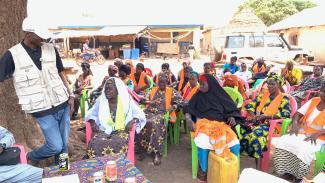Communities in Siguiri, a prefecture in northeastern Guinea on the River Niger are among the poorest in the country. Their most important means of generating family and community income include artisanal gold mining, petty trading, and cashew farming.
In these remote areas, most of the men and women do intense physical labor in order to extract gold dust from the undersoil, usually a few paltry milligrams at a time. A key cash crop is cashews, but producers experience significant challenges in producing quality cashew nuts. Aging trees, inconsistent varieties, a lack of adequate inputs, and outdated farming techniques, diminish annual crop yields. This situation makes it difficult for families in the communities to make ends meet with the meager earnings from their mining activities, and the low income from cashew farming.
In November 2019, USAID partnered with the global gold-mining company Société AngloGold Ashanti de Guinée to launch the Siguiri Agricultural Development Activity (SADA) to improve economic opportunities of communities affected by mining in the Siguiri prefecture by improving the agricultural market system—particularly through increasing value addition opportunities in the cashew value chain.
From 2020 to 2023, SADA supported 21 producer organizations through training on improved techniques and practices of cashew production using demonstration farms. Demonstration farms are used to teach various agricultural techniques and technologies, and showcase new or improved crops. They also serve as a venue to research and test new methods alongside traditional ones.
After the training, the activity distributed in-kind grants to equip each group with improved cashew seeds in preparation for the planting seasons. With these seeds, farmers planted new trees, applying the skills learned from the SADA training sessions. However, the SADA activity ends in 2023, that is before the trees begin bearing fruits.
“The trees the farmers planted are healthy and developing well. They are three years old now, which is the life of the SADA activity. They start bearing fruit after seven years. So, the impact of the improved practices and the quality of the fruits from the new trees will be seen in another four years” says Mr. Alseny Soumah, one of the trainers.
The trainers taught the cashew producers how to intercrop cashews with other food crops that the producers grow and sell. This allows them to earn a living while waiting for the cashew trees to mature. It also makes weeding of the cashew farms much easier.
One of the activity’s components provides empowerment and entrepreneurship training to women willing to join savings groups that are established afterwards.
The savings group is a simple financial intermediation model where members of a group contribute an agreed minimum amount of savings during weekly meetings. The funds are then loaned out to members based on demand. This goes on for a period of 12 months, when lending stops and outstanding loans are repaid in preparation for distributing the interest earned to members. The groups share the income generated over the cycle but retain the savings.
In 2021 a group of 33 women and two men from Nafadji, a remote community in Siguiri, working together in a voluntary community sanitation association (responsible for keeping the community clean by sweeping the surroundings and moving debris away), participated in empowerment and entrepreneurship training sessions organized by SADA and joined the savings group that was set up in the community. Their motivation and dedication were so high that different groups from different communities emulated them and came together to start their own savings and loan development associations and also create their own sanitation associations.
To date, the activity has established a total of 24 savings groups and trained 772 entrepreneurs and small business owners including 298 women in Nafadji community and six surrounding communities.
In almost two years of applying the skills learned from the SADA training sessions, the 24 savings groups raised a total of 549,377,000 GNF, or $64,632.00 USD.
Hawa Camara, one of the participants from Nafadji stated that the savings groups have solved a lot of problems in their community. “ Siguiri town is too far for us to deposit money in a bank there. And for security reasons, we could not keep money in our homes. So, this savings group serves as a bank within our reach” she said.
Part of the income generated from the savings and loans is used to pay school tuition and exam fees for the children of group members. Bebe Camara, President of one of the sanitation associations and other women in Nafadji say they have generated enough money from the savings groups to set up or improve their businesses. “Thanks to this activity, our children are all in school and their needs are catered for. Life in our community is also getting better” declared Kabine Camara, Nafadji community leader.
The SADA activity reached out to hundreds of people in Siguiri about improved farming practices and women’s empowerment and entrepreneurship.

Ousmane Condé. USAID Guinea
